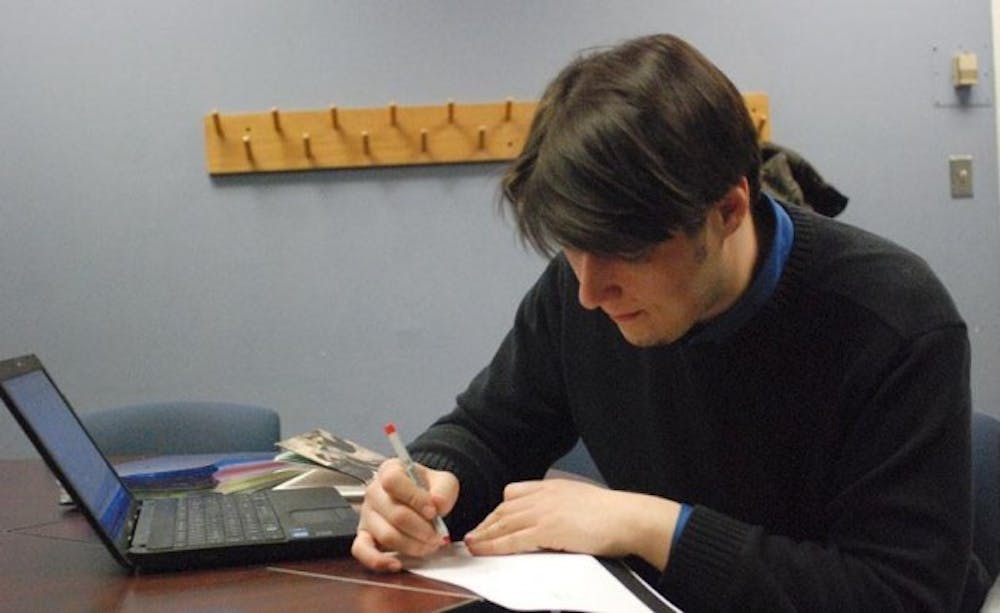The act was over, the audience was sitting silently and there was a moment of breathing. Just breathing. Mary Point-Dexter McLaughlin had just seen the act she wrote come to its dramatic conclusion and, in that moment, she knew her work had truly touched the audience.
She burst into tears.
That was when she knew she was hooked. Playwriting was what she needed to do. Point-Dexter McLaughlin is currently a student in the graduate program of Theatre & Performance, where she hones her craft and works to make herself a better artist.
UB began offering a master's program for theater this past fall. Dr. Sarah Bay-Cheng, the director of graduate studies, came to UB in 2005 with the goal to create a graduate program in theater; after years of hard work, the idea has become a reality, she said. Combining theory and practice, the one-year program offers students a close-knit environment to cultivate research, writing and production and performance skills.
Six to 10 students can enroll in the master's program per year, in addition to two to five Ph.D. students. Bay-Cheng believes the program's small size is vital to its success, as more intimate settings can provide more sincere mentorship.
"We really looked at what we could offer, and one of the things we thought the field needed and would serve our students best is very close mentorship," Bay-Cheng said. "Because it's such a relatively short program, we want to make it dense in terms of quality and attention."
A student's course track is designed to revolve around a core set of classes, but many also take classes in English, gender studies and media study departments. Point-Dexter McLaughlin and Jon Elston, another student in the program, take a poetry workshop Thursday nights to improve the lyrical elements of their writing.
Despite never having written poetry before, Point-Dexter McLaughlin finds the class to be one of the most stimulating and inspiring courses she's taken at UB.
"I feel that out of all my classes, that's the one that's sparking new ideas and possibilities for theatrical works in me," Point-Dexter McLaughlin said.
Point-Dexter McLaughlin entered the theater world as an actor, but after meeting her now-husband and becoming a mother of three, she's been happily propelled into the world of writing. She wrote The Buddha's Wife, a play publicly read this past August by Road Less Traveled Productions in Buffalo, and she is currently working on her master's thesis.
"Writing is something you can do anywhere, anytime - in between loads of laundry and during nap times," Point-Dexter McLaughlin said. "It suits my constitution better. Acting was really stressful. It was powerless. I felt like I had zero control over my life, my fate, my destiny."
Now, as a writer, Point-Dexter McLaughlin says she feels more in control of her craft.
"You can create something and say, 'I did that. That's mine,'" Point-Dexter McLaughlin said. "No one else owns it, no one else is going to tell me how to change it, how to be, that it's not good enough, that I need to be shorter, skinnier, prettier. That has no bearing on whether I can create art."
Elston, a fellow playwright, recalls beginning his journey into theater during his freshman year of high school. Playing a soldier with only five or nine lines in Leonard Wibberley's play The Mouse That Roared, Elston found a home for himself. The upperclassmen were kind to him, befriended him and made him "feel like a human engaging with other humans, engaging with artists."
In 2008, Elston's play The Elliptical debuted at the Road Less Traveled Theater, located on Buffalo's Main Street. In the play, the relationship between three close friends, Camille, Ches and Michelle, evolves from high school into adulthood. At one point during the performance, Ches says: "I won't tell you I wanted a life in the theater. I was really just looking for someone to talk to me. The rationality was drama club, acting, the arts - gotta be a population of lonely, maladjusted introverts, right? Let me tell you, that is a monumentally na??ve misconception."
Elston cites this semi-autobiographical piece of script as his reason for staying in theater after all these years.
Though Point-Dexter McLaughlin and Elston's main focus is scripts and playwriting, the master's degree caters to students with all kinds of theatrical interests.
"Performance is a really big tent," Bay-Cheng said. "It's this magical and really unique intersection of aesthetics, design, technology, collaboration, text music - it all comes together."
Both Elston and Point-Dexter McLaughlin appreciate the balance between practice and theory within the program. Though they consider themselves to be artists first, they believe their encounters with the theater's academic side have helped them grow immensely. The combination of scholarship and practice is intended to help immerse students into their craft and fully know their whole practice.
"I have never considered myself a theorist, an academic," Elston said. "But being in this program has really given me a sense for the flavor of theory and discourse and how really smart people all over the world write and think about theater."
Point-Dexter McLaughlin shares a similar sentiment, although she sometimes grows frustrated with the heavy dosages of theory. She'd rather be creating, and the theory doesn't always seem relevant to her craft.
Still, she and Elston see and appreciate the value in the theoretical explorations and enjoy engaging with their peers and professors.
email: features@ubspectrum.com





